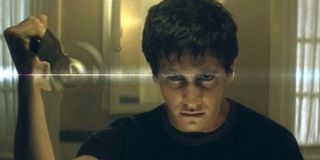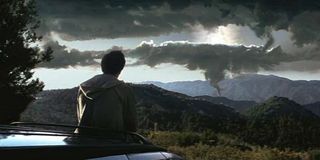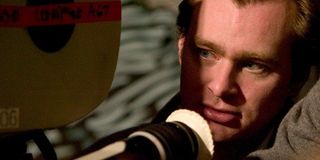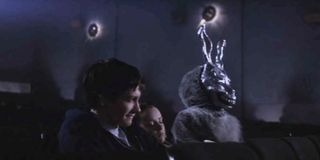That Time Christopher Nolan Saved Donnie Darko From Being A Direct-To-TV Movie

Christopher Nolan is known for reviving the Dark Knight’s cinematic presence with 2005’s Batman Begins. A little known fact has surfaced that he also saved Donnie Darko from a fate of obscurity.
In an interview with The Guardian, Richard Kelly, the writer and director of Donnie Darko, revealed that Christopher Nolan was instrumental in assuring that the 2001 cult classic, which melds John Hughes-style high school satire with dark, peculiar oddities reminiscent of David Lynch, secured a theatrical release. Otherwise, it would have been a (likely) forgotten TV movie.
Why was Donnie Darko burdened with such a troubled beginning and how did Christopher Nolan manage to help Richard Kelly get his film off of the ground? As if the world of Donnie Darko could not get deeper, let’s take a look at the movie from behind the scenes.

Donnie Darko’s Dark Beginnings
Richard Kelly was very early into his 20s when he wrote Donnie Darko in October of 1998, which explains its Halloween setting. Yet, the film’s cloudy philosophical messages and uncomfortable themes is what Hollywood seemingly found scary about it.
Donnie Darko stars a young Jake Gyllenhaal in the title role, a troubled, psychologically disturbed high school student in 1988 who begins to experience life-altering, bizarre occurrences that may or not be just his imagination.
Other than seeing visions of a man in a freakish-looking rabbit costume named Frank who claims the world is coming to an end, Donnie deals with his conservative parents’ conflicting ideologies, teachers threatened by his superior understanding of their own lessons, and a motivational speaker who may not be who he seems. That’s a lot for a teenager to carry on his shoulders.
Although its ambitious material nabbed a few well-known celebrities among its talented cast, including Patrick Swayze, Noah Wyle, and Drew Barrymore, Donnie Darko premiered at the Sundance Film Festival in 2001 to unimpressive results. Following “boos” at its initial screening, known distributors passed on the film feeling that a dark, violent story about a troubled high school student in a post-Columbine society was a recipe for disaster, as Richard Kelly recalled to The Guardian here:
CINEMABLEND NEWSLETTER
Your Daily Blend of Entertainment News
Darko was a disaster at Sundance too. No one remembers that, but it was. I’m grateful for any rosy glow of hindsight. I remember it took us almost six months to sell the movie. It almost went directly to the Starz network. We had to beg them to put it in theaters.
Richard Kelly feared that Donnie Darko, his baby, was destined to be thrown out as a cable movie reject. That was until he got a second chance when Aaron Ryder hosted a screening of the film and invited the up-and-coming director of the last film he produced, Memento, Christoper Nolan, to attend.

Christopher Nolan Raves About Donnie Darko
Christoper Nolan, the man behind acclaimed classics like Inception and The Dark Knight trilogy, had made his U.S. film debut in 2000 with Memento. Like Donnie Darko, the brain-teasing crime thriller had an infamous history at Sundance with no distributor wanting to buy the film -- despite winning the festival’s Screenwriting Award that year.
However, Memento did secure distribution from Newmarket, which proved successful for the production company and put Christopher Nolan on the map as a filmmaker to watch. With Nolan having earned Newmarket’s respect, producer Aaron Ryder decided inviting the filmmaker to his screening of Donnie Darko might be the jumpstart the film needed to earn a life on the big screen.
Christopher Nolan responded very enthusiastically to Donnie Darko. The filmmaker knew just who to relay his rave review to, as Richard Kelly has also mentioned:
Christopher Nolan stepped in and convinced Newmarket to put it in theaters.
Newmarket agreed to distribute Donnie Darko theatrically on their own, raising $25 million to put the movie through. It was released on October 26, 2001, to widespread critical success. Yet the movie still dealt with disappointing box office results.
Shown on just 58 screens, Donnie Darko opened at just $110,494, which led to a grand total of $517,375 by the end of its theatrical run in April 2002. Many credit the film’s depiction of a commercial plane crashing into Donnie’s house near the beginning and its release just a month after 9/11 as the ultimate cause of its initial failure.
Fortunately, as one of the philosophical themes within Donnie Darko posits, “destruction is a form of creation.” Out of its supposed destruction in terms of the box office success, DVD sales created new life for Richard Kelly’s masterpiece.

Donnie Darko Becomes A Cult Hit
In a twist of ironic fate, Donnie Darko, a movie that almost went straight-to-video, became a hit on video. The thriller raked in nearly $10 million and piqued the interest of audiences who were fascinated by its inventive imagery, dark subject matter, and intelligent take on existential angst. It's still available in various home entertainment formats, and even a Director's Cut.
Donnie Darko is still a widely beloved and deeply analyzed cult hit, having been re-released to theaters twice since its debut, which finally allowed it to surpass its budget. It even spawned a 2009 straight-to-DVD sequel, S. Darko, which focuses on Donnie’s younger sister Samantha (Daveigh Chase), but neither fans nor Richard Kelly, who had no involvement with the follow-up, really prefer to acknowledge its existence.
Richard Kelly was praised as the David Lynch of his time at the time for his work on Donnie Darko. In fact, Donnie Darko, 18 years after its initial release, is still considered his masterpiece, especially since his career has not seen much success outside of it.
Richard Kelly’s follow-up to Donnie Darko came five years later with Southland Tales, an off-putting social satire that, like Donnie Darko, deals with apocalyptic prophecies and focuses on a bizarre cast of characters in perplexing situations. The film failed to match the critical reception, or even box office returns, as Donnie Darko, but has found some new life on video since.
Richard Kelly’s biggest box office success to date with more than $15 million, is 2009’s The Box. Inspired by a short story by Richard Matheson, the thriller stars Cameron Diaz and James Marsden as a desperate couple who will be granted $1 million dollars by the push of a button on a strange-looking box. The catch is that pushing the button will also kill a random stranger.
The Box failed to impress critics and did nothing to help revive Richard Kelly’s reputation in Hollywood. He has not returned to filmmaking since, but is still widely looked up to as the creator of Donnie Darko.
Donnie Darko is a film of great mystery, but now its greatest mystery is what would this acclaimed hit have become if not for the help of Christopher Nolan -- of all people! From Donnie Darko to Batman, I believe it is safe to call Nolan a savior of some of cinema’s most memorable achievements.

Jason Wiese writes feature stories for CinemaBlend. His occupation results from years dreaming of a filmmaking career, settling on a "professional film fan" career, studying journalism at Lindenwood University in St. Charles, MO (where he served as Culture Editor for its student-run print and online publications), and a brief stint of reviewing movies for fun. He would later continue that side-hustle of film criticism on TikTok (@wiesewisdom), where he posts videos on a semi-weekly basis. Look for his name in almost any article about Batman.
Most Popular



